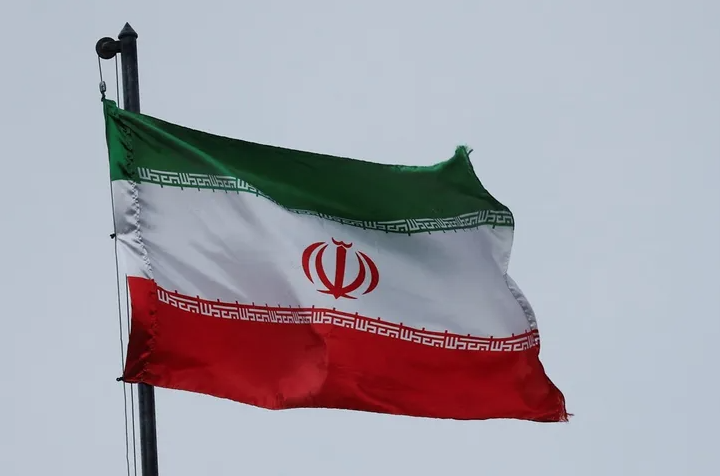President Joe Biden, speaking from the White House on Friday, expressed his anticipation of a potential attack from Iran on Israel in the near future.
While refraining from disclosing classified information, President Biden conveyed to reporters his expectation of such an attack happening sooner rather than later when questioned about its immediacy.
When pressed for his message to Iran amidst the escalating tensions, Biden succinctly stated, “Don’t.”
Addressing concerns about the safety of American troops, President Biden reassured that the United States remains steadfast in its commitment to defend Israel, emphasizing their unwavering support and determination to thwart any Iranian aggression.
When pressed for his message to Iran amidst the escalating tensions, Biden succinctly stated, “Don’t.”
Addressing concerns about the safety of American troops, President Biden reassured that the United States remains steadfast in its commitment to defend Israel pic.twitter.com/Fh3YKvmHjk— Türkiye Politik (@turkiyepolitik1) April 12, 2024
The heightened alertness stems from mounting apprehensions of a significant retaliatory strike from Iran against Israel, particularly following Israel’s recent military action targeting an Iranian diplomatic facility in Syria, resulting in the demise of three Iranian generals.
President Biden, who had earlier cautioned about Iran’s looming threat of a “significant attack” on Israel, has been closely briefed by his national security team on the evolving situation.
In response to the escalating tensions, the United States, along with other nations such as Britain and France, has issued updated travel advisories for government personnel in Israel as a precautionary measure against the perceived Iranian threat.
John Kirby, the National Security Council spokesman, affirmed the close monitoring of the situation while refraining from disclosing specific details regarding the anticipated timing of the threat.
The Defense Department is moving additional assets to the Middle East region “to bolster regional deterrence efforts and increase force protection for US forces,” a US defense official told CNN, as Israel and the US brace for a potential Iranian attack.
The Pentagon has been working specifically to bolster air defenses for the US troops stationed in Iraq and Syria who came under attack by Iran-backed proxy forces over 100 times between October and February. In January, three US servicemembers were killed when a drone got through US air defenses at the Tower 22 base in Jordan.
The US is not anticipating that Iran or its proxies will attack US forces as part of its retaliation but is moving the assets just in case.
“It would be imprudent if we didn’t take a look at our own posture in the region to make sure that we’re properly prepared,” Kirby said.
CNN reported last week that the US was on high alert and actively preparing for an attack by Iran targeting Israeli or American assets in the region. Officials said such an attack could come within the week.
Sources say Iran wary of dramatic escalation
CNN reported earlier this week that an Iranian attack on Israel would likely be carried out by Iranian proxy forces in the region rather than by Iran directly, according to two people familiar with US intelligence on the matter.
Tehran is wary of a dramatic escalation in the fighting, the sources said, and does not want to give the US or its allies an excuse to attack Iran directly.
The sources said Iran and its proxy militia groups do not appear poised to attack US troops or other assets in the region, but they noted that Iran does not have perfect command and control over all its proxy forces, so the possibility of an attack on US assets cannot be completely ruled out.
The sources told CNN that US intelligence assesses that Iran has urged several of its proxy militia groups to simultaneously launch a large-scale attack against Israel, using drones and missiles, and that they could attack as soon as this week.
“The threat is very clear and credible,” said one of the sources. “They have put the pieces in place to conduct the attack now. Just waiting for the right time.”
Biden spoke with his Israeli counterpart, Prime Minister Benjamin Netanyahu, about the threat of an Iranian attack during a telephone call last week.
A direct strike on Israel by Iran is one of the worst-case scenarios the Biden administration is bracing for, as it would guarantee rapid escalation of an already tumultuous situation in the Middle East. Such a strike could lead to the Israel-Hamas war broadening into a wider, regional conflict – something Biden has long sought to avoid.
Biden is receiving briefings multiple times a day on the situation, Kirby said.
Kirby said Friday that US officials were in “constant communication” with their Israeli counterparts about the matter and that steps were underway to ensure Israel is able to defend itself.
“We are certainly mindful of a very public and what we consider to be a very credible threat made by Iran in terms of potential attacks on Israel,” Kirby said Friday.
He pointed to a visit to Israel on Friday by US Central Command chief Gen. Erik Kurilla to have “those conversations directly with his IDF counterparts.”
However, US officials were frustrated with their Israeli counterparts over the lack of information Israel shared prior to carrying out the strike in Damascus last week, sources told CNN. Israel only informed a US official when its planes were already in the air en route to Syria, a separate US official said.
“We were not aware that Israel was going to carry out this airstrike in advance,” the official said. “Minutes before it happened and when Israeli planes were already in the air, Israel reached out to a U.S. official to say they were in the process of conducting a strike in Syria. It did not include any details on who they were targeting or where it would be conducted, and the strike was already underway before word could be passed through the U.S. government.”
Diplomatic pressure
Secretary of State Antony Blinken spoke with the foreign ministers of Turkey, China and Saudi Arabia to urge them to press Iran not to escalate the conflict in the Middle East after threats made by Iran against Israel, State Department spokesperson Matthew Miller said Thursday.
Miller said the US has also “engaged with European allies and partners over the past few days” to deliver a similar message on Iran. German Foreign Minister Annalena Baerbock and British Foreign Secretary David Cameron have both spoken to the Iranian foreign minister in recent days.
Blinken “has been making clear to every country that has any semblance of a relationship with Iran that it is in their interest to use that relationship to send a message to Iran that they should not escalate this conflict. But I will let those countries speak for themselves about what action they may or may not take,” Miller said.




